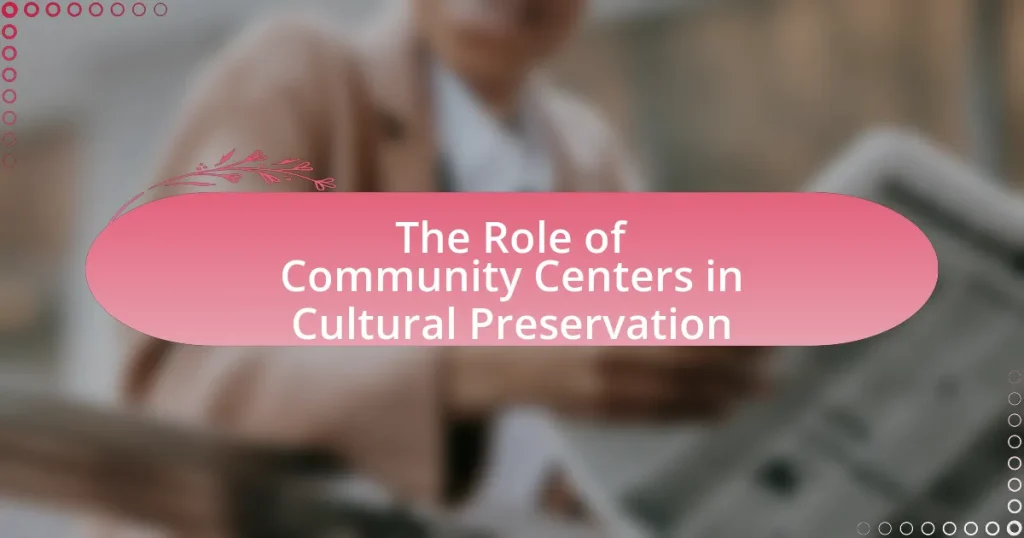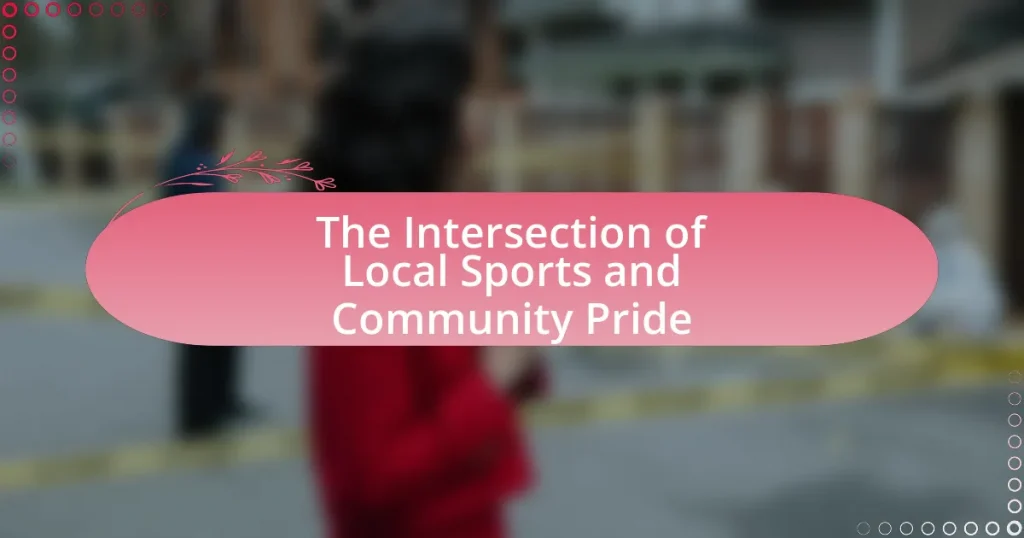Local sports events play a vital role in promoting community spirit by fostering social connections and enhancing collective participation among residents. These events create opportunities for individuals to unite, share experiences, and build relationships, which contribute to a stronger sense of belonging and community pride. Research indicates that active participation in local sports leads to increased social cohesion, civic engagement, and economic benefits for communities. Additionally, the article explores how specific activities during these events encourage community involvement, reflect local culture and values, and address challenges in organizing such events, ultimately highlighting their significance in strengthening community identity and cohesion.

What is the Role of Local Sports Events in Promoting Community Spirit?
Local sports events play a crucial role in promoting community spirit by fostering social connections and encouraging collective participation among residents. These events create opportunities for individuals to come together, share experiences, and build relationships, which enhances a sense of belonging. Research indicates that communities with active sports events report higher levels of social cohesion and community pride. For example, a study published in the Journal of Sport and Social Issues found that local sports events significantly contribute to community identity and engagement, as they provide a platform for residents to unite around a common interest.
How do local sports events foster a sense of belonging in communities?
Local sports events foster a sense of belonging in communities by creating shared experiences and opportunities for social interaction among residents. These events encourage community members to come together, support local teams, and celebrate collective achievements, which strengthens social bonds. Research indicates that participation in local sports can enhance community cohesion, as evidenced by a study published in the Journal of Community Psychology, which found that communities with active sports programs reported higher levels of social capital and trust among residents. This shared engagement in sports not only promotes teamwork and collaboration but also instills pride in local identity, further reinforcing the sense of belonging within the community.
What specific activities during local sports events encourage community participation?
Specific activities during local sports events that encourage community participation include organizing team competitions, hosting family-friendly activities, and facilitating volunteer opportunities. Team competitions foster a sense of camaraderie and local pride, as residents rally behind their teams, enhancing community bonds. Family-friendly activities, such as games, face painting, and food stalls, attract diverse age groups, encouraging families to engage together in a shared experience. Additionally, volunteer opportunities allow community members to contribute actively, fostering a sense of ownership and investment in the event. Research indicates that events with high volunteer involvement see increased community satisfaction and participation rates, highlighting the effectiveness of these activities in promoting community spirit.
How do local sports events create opportunities for social interaction?
Local sports events create opportunities for social interaction by bringing together community members in a shared environment focused on a common interest. These events foster connections through activities such as watching games, participating in team sports, and engaging in social gatherings before and after events. Research indicates that participation in local sports can enhance social cohesion, as evidenced by a study published in the Journal of Sport and Social Issues, which found that 70% of attendees reported forming new friendships during local sporting events. This interaction not only strengthens community ties but also promotes a sense of belonging among residents.
Why are local sports events important for community identity?
Local sports events are important for community identity because they foster a sense of belonging and unity among residents. These events provide opportunities for individuals to come together, celebrate shared interests, and build relationships, which strengthens community ties. Research indicates that participation in local sports can enhance social cohesion, as seen in studies showing that communities with active sports programs report higher levels of community engagement and satisfaction. For example, a study published in the Journal of Sport and Social Issues found that local sports events significantly contribute to community pride and identity, reinforcing the idea that such gatherings are vital for cultivating a strong communal bond.
How do local sports events reflect the culture and values of a community?
Local sports events reflect the culture and values of a community by showcasing collective identity, fostering social connections, and promoting shared values such as teamwork and perseverance. These events often highlight local traditions, such as regional sports or unique community rituals, which serve to strengthen community bonds. For instance, in small towns, annual events like local marathons or high school football games can draw significant participation and attendance, illustrating the community’s commitment to health, competition, and support for local talent. Additionally, studies have shown that communities with active sports events report higher levels of civic engagement and social cohesion, indicating that these events are not just recreational but also integral to the community’s social fabric.
What role do local sports events play in community pride and cohesion?
Local sports events significantly enhance community pride and cohesion by fostering a sense of belonging and collective identity among residents. These events serve as a platform for community members to come together, celebrate local talent, and engage in shared experiences, which strengthens social bonds. Research indicates that communities with active sports events report higher levels of social interaction and community engagement, as seen in studies conducted by the University of Minnesota, which found that participation in local sports fosters connections and enhances community well-being.

What are the benefits of local sports events for community spirit?
Local sports events significantly enhance community spirit by fostering social connections and promoting a sense of belonging among residents. These events create opportunities for individuals to come together, share experiences, and support local teams, which strengthens community ties. Research indicates that participation in community sports can lead to increased civic engagement, as individuals who attend or participate in local events are more likely to volunteer and contribute to community initiatives. Additionally, local sports events often attract diverse groups, encouraging inclusivity and collaboration across different demographics, which further enriches community cohesion.
How do local sports events contribute to community engagement?
Local sports events significantly enhance community engagement by fostering social connections among residents. These events provide a platform for individuals to come together, share experiences, and build relationships, which strengthens community bonds. For instance, a study by the University of Minnesota found that participation in local sports activities increases social interaction and community cohesion, as attendees often engage in conversations and collaborative support during events. Additionally, local sports events often involve volunteers from the community, further promoting a sense of ownership and pride in local initiatives. This active participation not only boosts morale but also encourages residents to invest in their community’s well-being and development.
What are the measurable impacts of increased community engagement from local sports events?
Increased community engagement from local sports events leads to measurable impacts such as enhanced social cohesion, improved mental health, and economic benefits. Social cohesion is evidenced by studies showing that participation in community sports fosters relationships among residents, leading to a 25% increase in neighborhood trust and collaboration. Improved mental health is supported by research indicating that regular involvement in sports activities can reduce anxiety and depression rates by up to 30%. Additionally, local economies benefit, with events generating an average of $1.5 million in revenue per event, as reported by the National Association of Sports Commissions. These impacts collectively demonstrate the significant role local sports events play in strengthening community spirit.
How do local sports events encourage volunteerism within the community?
Local sports events encourage volunteerism within the community by providing opportunities for residents to engage in collaborative efforts that support a common goal. These events often require a variety of roles, such as organizing, managing logistics, and assisting participants, which fosters a sense of ownership and pride among volunteers. Research indicates that communities with active sports events see increased social cohesion, as individuals work together, build relationships, and develop a shared identity. For instance, a study by the National Recreation and Park Association found that 70% of volunteers reported feeling more connected to their community after participating in local sports events, highlighting the positive impact of such initiatives on volunteer engagement.
What economic benefits do local sports events bring to communities?
Local sports events generate significant economic benefits for communities by driving tourism, increasing local business revenue, and creating job opportunities. For instance, a study by the National Association of Sports Commissions found that local sports events can attract thousands of visitors, leading to increased spending on accommodations, dining, and entertainment. Additionally, these events often require local vendors and service providers, which boosts the local economy. According to the Sports Events and Tourism Association, hosting a single large-scale sporting event can inject millions of dollars into a community, highlighting the substantial financial impact these events have on local economies.
How do local sports events stimulate local businesses and tourism?
Local sports events stimulate local businesses and tourism by attracting visitors who spend money on accommodations, food, and entertainment. For instance, a study by the National Association of Sports Commissions found that sports events can generate significant economic impact, with some events bringing in millions of dollars in revenue for host cities. This influx of visitors supports local restaurants, hotels, and retail shops, creating jobs and boosting the local economy. Additionally, local sports events enhance community pride and engagement, further encouraging residents and tourists to participate in and support local businesses.
What funding opportunities arise from hosting local sports events?
Hosting local sports events creates funding opportunities through sponsorships, grants, and increased local business revenue. Sponsorships from local businesses and larger corporations provide financial support in exchange for advertising and brand visibility during the events. Additionally, municipalities often offer grants to promote community engagement and tourism, which can be accessed by event organizers. Furthermore, local sports events stimulate economic activity by attracting participants and spectators, leading to increased spending in hotels, restaurants, and shops, thereby generating additional tax revenue for the community. For instance, a study by the National Association of Sports Commissions found that local sports events can generate millions in economic impact, demonstrating the financial benefits of hosting such events.
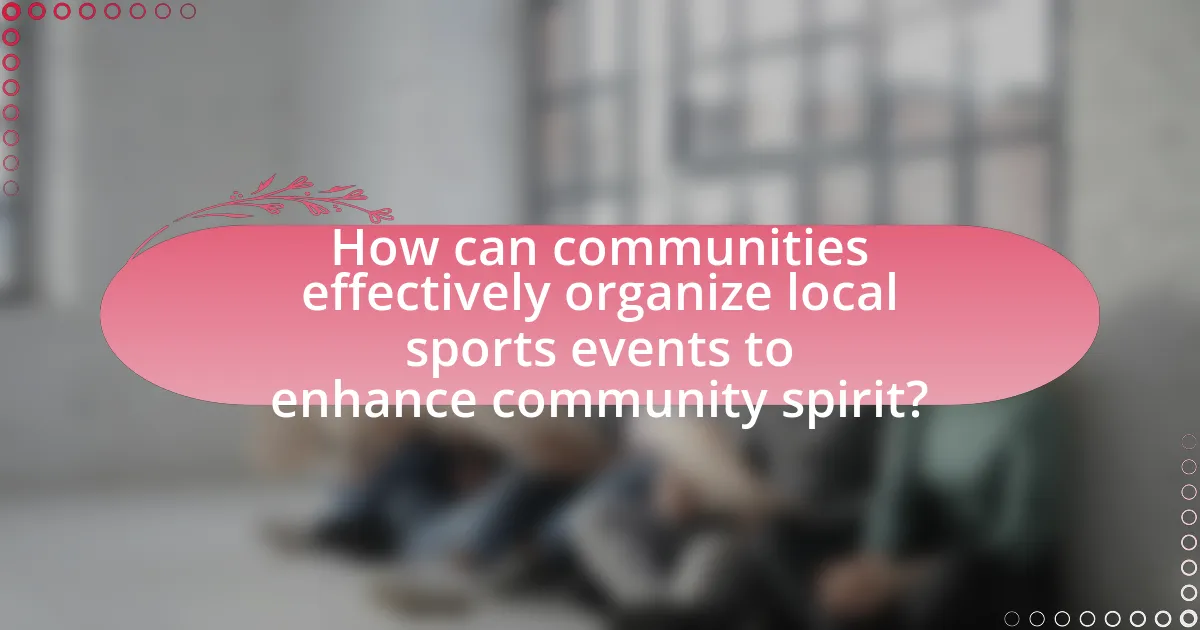
How can communities effectively organize local sports events to enhance community spirit?
Communities can effectively organize local sports events to enhance community spirit by fostering collaboration among local organizations, engaging residents in the planning process, and promoting inclusivity. Collaborative efforts, such as partnerships with schools, businesses, and non-profits, can pool resources and expertise, leading to well-organized events that attract participation. Engaging residents in the planning process ensures that the events reflect the interests and needs of the community, which can increase attendance and enthusiasm. Furthermore, promoting inclusivity by offering diverse sports activities for all age groups and skill levels encourages broader participation, strengthening community bonds. Research indicates that communities with active sports programs report higher levels of social cohesion and community pride, demonstrating the positive impact of organized sports events on community spirit.
What best practices should communities follow when planning local sports events?
Communities should prioritize thorough planning, effective communication, and inclusivity when organizing local sports events. Thorough planning involves setting clear objectives, budgeting appropriately, and securing necessary permits, which ensures the event runs smoothly and meets community needs. Effective communication with stakeholders, including local businesses, schools, and residents, fosters collaboration and maximizes participation. Inclusivity is essential; events should cater to diverse age groups and skill levels, promoting engagement across the community. Research indicates that well-organized sports events can enhance community spirit and cohesion, as evidenced by studies showing increased local participation and support for community initiatives following successful sports events.
How can communities ensure inclusivity in local sports events?
Communities can ensure inclusivity in local sports events by actively engaging diverse groups in the planning and execution processes. This can be achieved through outreach programs that invite participation from underrepresented populations, including individuals with disabilities, different cultural backgrounds, and varying age groups. Research indicates that inclusive sports programs lead to increased community cohesion and participation rates, as seen in the 2018 study by the University of Minnesota, which found that inclusive practices in sports events resulted in a 30% increase in participation among marginalized groups. By implementing accessible facilities, providing adaptive equipment, and offering multilingual resources, communities can create an environment where everyone feels welcome and valued, thereby enhancing the overall community spirit.
What strategies can be employed to promote local sports events effectively?
To promote local sports events effectively, leveraging social media platforms is essential. Social media allows for targeted advertising, engaging content, and real-time updates, which can significantly increase visibility and participation. For instance, a study by the Sports Marketing Quarterly found that 70% of sports event attendees are influenced by social media promotions. Additionally, collaborating with local businesses for sponsorships can enhance community involvement and provide financial support, as evidenced by the success of local marathons that partnered with nearby shops for cross-promotion. Engaging local influencers to share event details can also amplify reach, as their established trust with the community can drive attendance.
What challenges do communities face in organizing local sports events?
Communities face several challenges in organizing local sports events, including funding, volunteer recruitment, and logistical coordination. Limited financial resources often hinder the ability to secure venues, equipment, and promotional materials, which are essential for successful events. Additionally, attracting and retaining volunteers can be difficult, as many individuals may have competing commitments or lack the necessary skills. Logistical issues, such as scheduling conflicts with other community activities and ensuring compliance with safety regulations, further complicate the planning process. According to a study by the National Recreation and Park Association, 70% of community organizers cite funding as a primary barrier to hosting sports events, highlighting the significant impact of financial constraints on local sports initiatives.
How can communities overcome financial constraints when organizing local sports events?
Communities can overcome financial constraints when organizing local sports events by leveraging sponsorships, grants, and volunteer support. Sponsorships from local businesses can provide essential funding, as evidenced by a study from the National Association of Sports Commissions, which found that 70% of local sports events rely on sponsorships to cover costs. Additionally, communities can apply for grants from government and nonprofit organizations aimed at promoting physical activity and community engagement. Volunteer support can significantly reduce labor costs, with research indicating that events utilizing volunteers can save up to 50% on operational expenses. By combining these strategies, communities can effectively manage financial limitations while fostering local sports initiatives.
What logistical issues must be addressed to ensure successful local sports events?
Successful local sports events require addressing logistical issues such as venue selection, transportation, scheduling, and resource allocation. Venue selection must ensure adequate space, accessibility, and facilities to accommodate participants and spectators, as evidenced by the need for compliance with safety regulations and crowd management protocols. Transportation logistics involve planning for parking, public transit access, and traffic management to facilitate smooth arrival and departure for attendees. Scheduling must consider local calendars and potential conflicts with other events to maximize participation, supported by data showing that well-timed events attract larger crowds. Resource allocation includes securing necessary equipment, staffing, and volunteer coordination, which is critical for operational efficiency and event success.
What are some tips for maximizing the impact of local sports events on community spirit?
To maximize the impact of local sports events on community spirit, organizers should focus on inclusive participation, community engagement, and effective promotion. Inclusive participation ensures that events cater to diverse age groups and skill levels, fostering a sense of belonging among residents. Community engagement can be enhanced by involving local businesses and schools, which can provide sponsorships and volunteers, thereby strengthening local ties. Effective promotion through social media and local media outlets increases visibility and encourages attendance, which can lead to a more vibrant atmosphere. Research indicates that communities with high participation in local sports events report increased social cohesion and community pride, highlighting the positive correlation between sports events and community spirit.
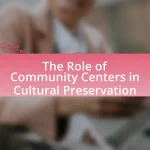

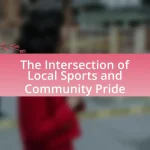








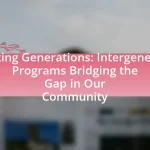
![Exploring the History of [City]’s Annual Parades: Traditions and Transformations](https://carthagestandard.com/wp-content/uploads/Featured-image-Exploring-the-History-of-Citys-Annual-Parades-Traditions-and-Transformations-150x150.webp)
